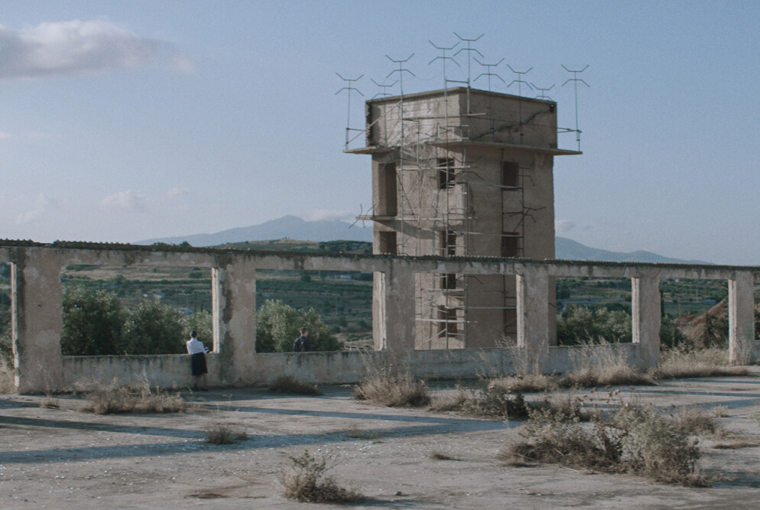“No More Cassettes!”
Christos Passalis’ Silence 6-9 (Isihia 6-9, 2022)
Vol. 125 (May 2022) by Jack Page
In a not-so-distant future, the living cling to the memories of deceased loved ones by listening to messages their spirits whisper to them in the sky. These words are recorded by clusters of low-grade antennas littered throughout a town that is now deserted. The exhausted “manager” (a sound engineer who orchestrates the process) dedicates the period of 6 am to 9 am every morning to his trade and by law, inhabitants are ordered to keep noises to a minimum during this time. The quietness limits the amount of audible interference when recording and the dead’s radio-like speech can be captured loud and clear. However, some cassettes are better than others, leaving muddled and incoherent noises, which causes panic for the grieving citizens who line up outside the manager’s office, ready to complain. A stranger, Aris (played by the film’s director), is sent in to maintain the failing satellite equipment and fix the manager’s technical problems. He shares a hotel with one other guest, Anna (Angeliki Papoulia). After each encounter their intimacy intensifies, and Aris soon discovers her profession in the town. A niche group of men in mourning hire women to perform the dialogues of their cassette tapes. With the aid of an instructional VHS, the women are required to study their subjects by dressing and acting like the men’s wives and girlfriends. The clients then watch Anna and her troupe through a peep hole in the wall as they relay the words from the cassettes.
Passalis’ film is a boldly inventive sci-fi love story. The evolution of Aris and Anna’s relationship is eked out with every scene they share together; from faraway glances and close encounters to stolen kisses and finally becoming runaway lovers. The character development of these protagonists is at its best only when they share the screen together. It is an innovative method by the director, allowing the audience’s emotional involvement to match that of Aris and Anna’s trajectory. The closer they become, the better the viewer’s understanding of the narrative. In the film’s third act, it is revealed that these kindred souls are in fact two comatose patients sharing a room in hospital. Their doctor is unveiled as the manager from the alternate reality in which spirits populate the sky, as well as the nurses, who also play the hotel concierge. Although it is never fully explained, Aris and Anna share a subconscious, infringing on each other’s dreams. Real-life events in our world start to gravely impact Anna as her health deteriorates. The effect of the coma takes its toll on the dehydrated patient. In the alternate reality, her lips begin to crack and bleed. Anna’s hotel room in the alternate reality is filled with glasses full of water that sit on piles of dirt. The concierge implores her to drink, echoing the nurse’s instructions in our reality. The efficiency of Passalis as a filmmaker never ceases to amaze in Silence 6 – 9, in this instance creating two parallel universes with such scarce and simple imagery without jeopardizing any of the film’s mystery by oversimplification.
In a parking lot full of rusted, broken-down vehicles, the crazed ex-Mayor of the town chants in protest: “No more cassettes!”. He roams the streets with a loudspeaker, preaching the failure of the tapes: “No one has ever come back!”. Aligned with the film’s ideology, this scene exposes the futility and tortuous existence people live when refusing to let go of the dead. The tragic male figures of Silence 6 – 9 attach themselves to useless artifacts (such as the outmoded technology of cassettes or juvenile instruments like the melodica) in the hope it will bring them closer to the ones they have lost. It is only when they stop living their lives in the past that they can be liberated and are no longer ruled by the messages on the tapes. And if the town has no more use for cassettes, then the silent period does not need to be enforced, resulting in what we can only imagine would be a prosperous and communicative townspeople. This sense of freedom is achieved when Anna finally passes away. As she crosses over from her shared subconscious with Aris to our reality, she visits his hospital bed and murmurs in his ear not to wake up. In the following scene, they elope in the back of a truck together, driven by the ex-Mayor and his cohorts. The finale suggests that Aris will never awake from his coma and that he has chosen love over life. Their future together is unsure but at the very least it is unshackled by the bonds that ground and restrict our everyday reality.
Silence 6 – 9 is a perfect example of Greece’s continued production of unique cinematic features. Passalis’ understated story dodges all kinds of generic conventions, leaving the spectator with a bittersweet tale of the limitations of grief and memory alongside the liberations of love and hope. Critics and audiences alike will no doubt compare the film to the works of American independent auteur Charlie Kauffman, and Passalis’ visionary prowess is something to look forward to in what is likely to become an illustrious directing career.




Leave a Comment